

Why Readers, Scientifically, Are The Best People To Fall In Love With. Ever finished a book?

I mean, truly finished one? Cover to cover. Closed the spine with that slow awakening that comes with reentering consciousness? You take a breath, deep from the bottom of your lungs and sit there. Book in both hands, your head staring down at the cover, back page or wall in front of you. You’re grateful, thoughtful, pensive. Like falling in love with a stranger you will never see again, you ache with the yearning and sadness of an ended affair, but at the same time, feel satisfied. This type of reading, according to TIME magazine’s Annie Murphy Paul, is called “deep reading,” a practice that is soon to be extinct now that people are skimming more and reading less.
Readers, like voicemail leavers and card writers, are now a dying breed, their numbers decreasing with every GIF list and online tabloid. They can entertain other ideas, without rejecting them and still retain their own. Why kids are better off without homework. Down with homework!

Source: Getty Images CHILDREN in primary school should not be wasting their time on homework – it is a provocative idea. But research into the impact of homework learning outcomes, and motivation, tells a relatively clear story. Four Skills to Teach Students In the First Five Days of School. Jane Mount/MindShift The first few days of school are a vital time to set the right tone for the rest of the year.
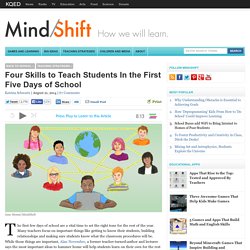
Many teachers focus on important things like getting to know their students, building relationships and making sure students know what the classroom procedures will be. While those things are important, Alan November, a former teacher-turned-author and lecturer says the most important ideas to hammer home will help students learn on their own for the rest of the year.
“The name of the game is to find the right information with the right question,” said November during a workshop at the 2014 gathering of the International Society of Technology in Education in Atlanta. “My job used to be to give you the information, now my job is to teach you how to find the information.” “The best teachers were kids who had really struggled with the material and really understand what it’s like to learn.” Une tendance «irréversible» Connexion.

Propos. 26 Questions Every Student Should Be Able To Answer. 26 Questions Every Student Should Be Able To Answer by Terry Heick These questions are more about the student than you, your classroom, or education.
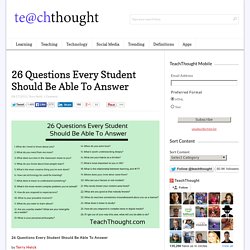
What every student should know starts with themselves and moves outwards to your content area: self knowledge–> content knowledge. As an educator, your job is lead students to understanding, but student self-awareness and self-knowledge should precede that. Six-tendances-qui-vont-révolutionner-le-monde-de-léducation-e1408719606689.png 1 500 × 759 pixels. iPad en classe : Des conditions de succès pour initier un réel changement. What Parents Want From Technology In The Classroom. Here’s an interesting perspective to take on technology in the classroom.
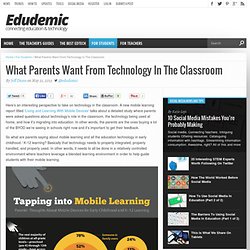
A new mobile learning report titled ‘Living and Learning With Mobile Devices‘ talks about a detailed study where parents were asked questions about technology’s role in the classroom, the technology being used at home, and how it’s migrating into education. In other words, the parents are the ones buying a lot of the BYOD we’re seeing in schools right now and it’s important to get their feedback. So what are parents saying about mobile learning and all the education technology in early childhood / K-12 learning? Basically that technology needs to properly integrated, properly handled, and properly used. Un portable par élève : une expérience concluante » Presse-Éducation.com.
What Is The Future Of Education? Infographic - e-Learning Infographicse-Learning Infographics. Gamification: Your Learners Deserve To Be Delighted And Excited. When was the last time you actually enjoyed learning?

Just think for a moment: think about a particular time when you were passionate about learning something, truly motivated, engaged and enthusiastic; a time when your training made you smile; when you could visualize just how the training would benefit you and your life and you couldn’t wait to work your way through it. Are you struggling to think of anything? You’re not alone. Too often, training is staid, boring, tedious and, simply put, awful!
8 lessons for effective school leadership SmartBlogs. Évaluer, oui ! Mais évaluer quoi ? NOTE : cet article était supposé paraitre ici, mais étant sans nouvelles de l’organisme en question depuis avant la date de tombée de ce billet, je le publie ici en attendant, puisque d’actualité présentement.
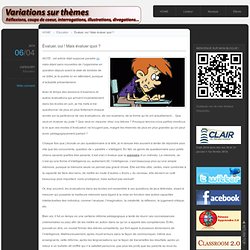
Avec le temps des sessions d’examens et autres évaluations qui arrivent invariablement dans les écoles en juin, je me mets à me questionner de plus en plus fortement chaque année sur la pertinence de ces évaluations, de ces examens, de la forme qu’ils ont actuellement… Que veut-on évaluer au juste ? Habits for Success in School and Life. Take a moment to join us in a snapshot of a classroom we recently observed: Students are hard at work designing a travel brochure as a part of their study of Ireland.
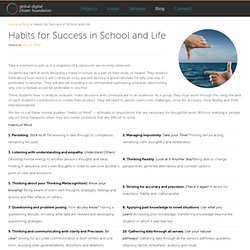
They need to think about how much it will cost by air or by sea and develop a good rationale for why one way is preferable to another. They will also be including a recommended sightseeing schedule, determining why one schedule would be preferable to another. These students have to analyze, evaluate, make decisions and communicate to an audience. As a group, they must work through this using the best of each student’s contributions to create their product. We like to call these mental qualities “Habits of Mind” — attitudes or dispositions that are necessary for thoughtful work. Habits of Mind Managing your impulsivity is a habit of mind that can take years to develop.
It may take many years for the Habits of Mind to become internalized. École : la fracture numérique n'est pas là où on la croit... 11/11/11, 11 heures, 11 minutes et 11 secondes…

Barrette_19_3.pdf. 3 ways internet filtering inhibits learning. New report examines filtering issues and offers 4 recommendations Growing up in the digital age means that students have an infinite amount of information available through the internet, but it also means learning reasonable and safe behavior while online. Federal regulations such as the Children’s Internet Protection Act (CIPA), which requires schools and libraries that receive federal funds to install filtering software in an attempt to keep users from accessing online content deemed harmful for obscene, have in recent years been the subject of heated debates between those advocating for unfiltered internet access in schools and libraries and those who prefer a more secure learning style for younger students. Filtering also raises issues for adults using public and school libraries. “This overreach stems from misinterpretations of the law, different perceptions of how to filter, and limitations of internet filtering software.
Les maudites moyennes. En direct du primaire. The Myths of Technology Series – “Technology equals engagement” For ISTE 2014 in Atlanta, I will be presenting on the “Myths of Technology and Learning”. As I am really thinking about what I will be sharing at the conference, I wanted to write a series of blog posts that will help myself and others “rethink” some of these statements or arguments that you hear in relation to technology in school.
I will be writing a series of blog posts on different myths, and will be posting them on this page. I hope to generate discussion on these topics to further my own learning in this area and appreciate any comments you have on each idea shared. Myth One; Technology Equals Engagement I saw the picture below shared online, and I will have to admit, it made me laugh. Jeux numériques épistémiques et évaluation des apprentissages. The Case for Banning Laptops in the Classroom - The New Yorker. A colleague of mine in the department of computer science at Dartmouth recently sent an e-mail to all of us on the faculty. The subject line read: “Ban computers in the classroom?”
The note that followed was one sentence long: “I finally saw the light today and propose we ban the use of laptops in class.” While the sentiment in my colleague’s e-mail was familiar, the source was surprising: it came from someone teaching a programming class, where computers are absolutely integral to learning and teaching. Surprise turned to something approaching shock when, in successive e-mails, I saw that his opinion was shared by many others in the department. My friend’s epiphany came after he looked up from his lectern and saw, yet again, an audience of laptop covers, the flip sides of which were engaged in online shopping or social-media obligations rather than in the working out of programming examples.
I banned laptops in the classroom after it became common practice to carry them to school. Imagining-wearable-technology-in-the-classroom.png (PNG Image, 558 × 1811 pixels) - Scaled (55%) La conception d'applications au secondaire permet d'attirer plus de filles dans le secteur des nouvelles technologies! OTTAWA, le 25 mai 2014 /CNW/ - Le 3e concours AppJam de MaTechno.me, administré par le Réseau d'Ottawa pour l'éducation (ROPE) prouve que les filles s'intéressent davantage à la technologie si elles suivent des cours dans ce domaine à l'école secondaire. Qu'est-ce qui fait obstacle au changement en éducation? 30 Trends In Education Technology For 2015. 30 Trends In Education Technology For The 2015 School Year by Terry Heick. Tech Integration and School Culture.
The more I work with schools that are seeking out device integration, the more I stress the importance of developing a school culture around those devices. I've seen technology initiatives falter or lose momentum when devices suddenly appeared and magic was expected to happen. What’s more, we cannot expect students and teachers to simply adapt to technology because it's the 21st century and Twitter says so. A Vision of the Future From Those Likely to Invent It. “Phones and computers will automatically do anything tedious that doesn't require brainpower, like signing up for a web site or app. The march of technology is the incessant march of convenience.” Ev Williams. This is Why Kids Need to Learn to Code #makereducation « adafruit industries blog. Branching scenario design: How many decision points? You’ve decided a branching scenario will be part of your project.
But how long should it be? First, I’m assuming that we’re talking about an exploratory or “learning” scenario, meaning a story in which learners make decisions without a lot of hand-holding and learn from the consequences of their decisions. I’m also assuming that the skill you want learners to develop is relatively complex, such as managing a conversation to create the best results. Aim for 7 decision points in most paths As a general rule I recommend that each path include at least 7 decision points, meaning even if I make a not-great decision, I continue down a path that includes more decisions, including ones that could lead me to a better path, and when I reach the end of the story, I’ve made about 7 (challenging! Les défis de l’école d’aujourd’hui. Retour sur le 2e Sommet sur l’iPad en éducation : la parole aux élèves! Retour sur les activités ayant mis en vedette des élèves à l’occasion du 2e Sommet sur l’iPad en éducation.
Rafraîchissants à souhait, impliqués et authentiques, ils ont su démontrer que, plus que jamais, ils ont leur place dans les rencontres en éducation. Plus d’autonomie pour les enseignants. Les défis de l’école d’aujourd’hui. The Invisible iPad: It’s Not About the Device. Le web social, un levier de développement professionnel? We think you may be lost — 403 Error. Tout ce que vous devez savoir sur le BYOD. La Nouvelle-Zélande révolutionne son système d’éducation. L’engagement et le mythe technologique en classe.
Tech Integration and School Culture. Revue éducation et francophonie - Sommaire. Revue éducation et francophonie - Résumé. Éducation - Répertoire de ressources en technopédagogie. Les sept caractéristiques des technopédagogues hautement efficaces. WikiniMST:StrategieGagnantesIntegrationTIC. Construire votre « tribu » technologique. Bloom's Digital Taxonomy. Ruben R. Puentedura's Weblog. Training design ideas from Cathy Moore.